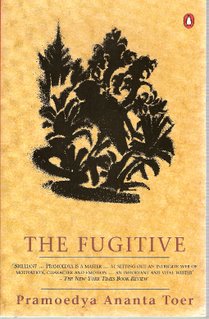 Review: The Fugitive, Pramoedya Ananta Toer (1990)
Review: The Fugitive, Pramoedya Ananta Toer (1990)Written "when he was a prisoner from 1947 to 1949 at the forced labor camp of Bukitduri" while imprisoned by the Dutch, according to Tariq Ali, and published in 1950, The Fugitive is a liberation novel, set in the final hours of the Japanese wartime occupation of Indonesia.
Opening in the calm of darkness the novel traces the movements of Hando, a fugitive. It reminded me of Beckett, especially his preference for having only two interlocutors speaking on a stripped-down stage of action. In many ways this novel resembles stage drama, and would be easy, I think, to adapt for the theatre.
After reading a chapter, I came away with my senses filled with the reality of life in the small country town where the action is set, and also of the wider reality of wartime Indonesia. Toer has successfully evoked a whole period through the intimate dialogues he creates, which are interspersed with passages dedicated to the landscape. The land figures large in his narrative and, through it, he is able to conjure up a whole nation of people who want liberation from the hated Japanese.
The Japanese officer is relentlessly nasty, covetous of his power and the respect of people who he evidently considers below him. Hando, on the contrary, disguised as a beggar, is mystical and human, and able to concieve of larger possibilities. In one comical scene set in the darkness of a hut amid fields of corn, he converses with his own father. The tension between respect for his parent and disgust at his father's behaviour is gripping.
Pramoedya's relationship with his country may have contributed to increase this sort of tension. Following liberation, he was imprisoned by the Suharto regime for many years and, even when released through the efforts of international activists, his freedom was conditional. "[U]ntil 1992," says Ali, "he was confined to house arrest in Jakarta and forced to report regularly to the police".
"Had Pramoedya Ananta Toer been a Soviet dissident he would have received the Nobel Prize," continues Ali. I have to agree. The Fugitive is his first novel. Although its scope is limited in time and place, and the number of actors is restricted to only a select few, it is an assured and compelling drama of the first order.
1 comment:
Sounds brilliant.
Post a Comment